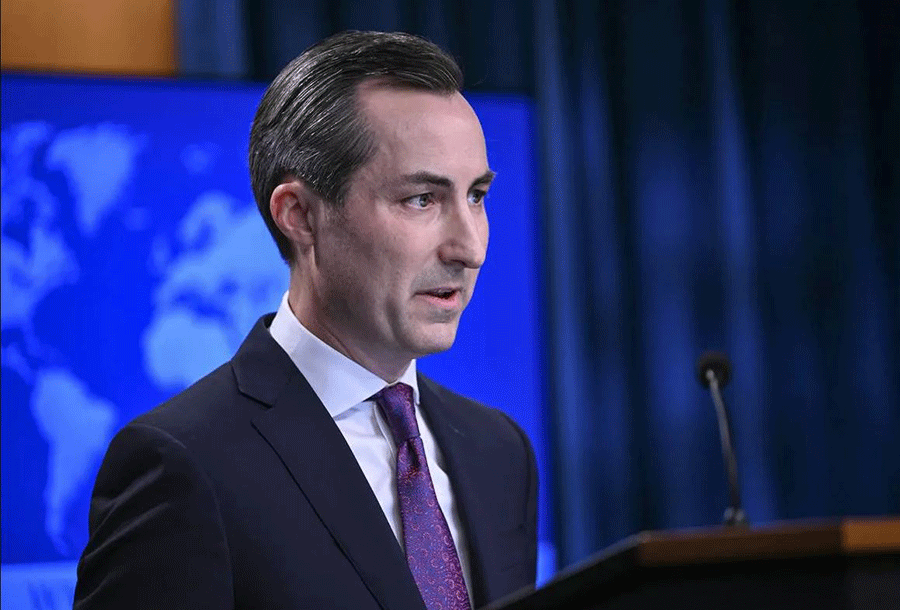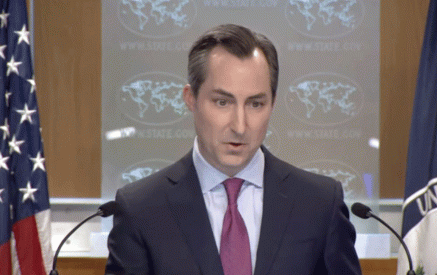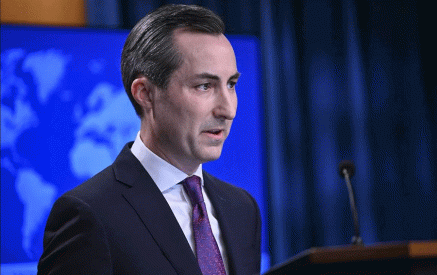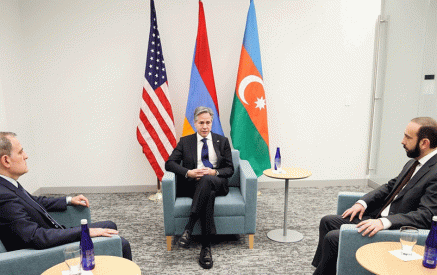Department Press Briefing – September 25, 2023
MATTHEW MILLER, DEPARTMENT SPOKESPERSON
QUESTION: Can I go to Nagorno-Karabakh —
MR MILLER: Sure.
Read also
QUESTION: — the situation there? Obviously there have been some statements in recent days from the Secretary and from others. But could you comment on the latest attack? I mean, we’ve seen a stream of people fleeing – like Armenians fleeing Nagorno-Karabakh. How concerned are you with the situation and the assurances that Azerbaijan has given about allowing ethnic minorities to stay there? Do you take that at face value? Are you confident that that’s the case?
MR MILLER: We are concerned about the situation. I will say that in terms of what we think is important, it’s, number one, that the ceasefire that exists now be maintained, that there is no further military action; number two, that the humanitarian needs of the people of Nagorno-Karabakh are addressed; and number three, that Azerbaijan and Armenia reach a lasting peace agreement.
With regard to the humanitarian situation from the ground, the population of ethnic Armenians in Nagorno-Karabakh should be able to remain in their homes in peace and dignity, with respect for their rights and security if they choose to do so. Those who want to leave and return should be allowed safe passage overseen by a neutral, independent third party. And Azerbaijan has a responsibility to protect civilians and ensure the humane treatment of all, including those it suspects of being combatants.
QUESTION: A couple things. The Armenians have called for some sort of international monitoring, whether it’s through the UN or through other partners. Is that something that the United States supports or would work toward?
MR MILLER: We do believe there should be an international mission to provide transparency, reassurance, and confidence to the residents of Nagorno-Karabakh and the international community, that the rights and security – their rights and security will be protected consistent with the public statements that Azerbaijan has made.
QUESTION: Just briefly following up on that, an international mission, is that something that’s – are there actual discussions on that? Is the U.S. working on —
MR MILLER: There have been active discussions about it. I don’t have any readout of those discussions, but it is – we do – we have called for such a mission some time, and we are working with our allies and partners to secure one.
QUESTION: Sure. Can I just pursue one other thing on this? The – on the diplomatic side, there’s been a war of words of sorts between Prime Minister Pashinyan and the Russians, with the Armenian prime minister saying that Russia failed to protect Armenia, that Armenia should essentially seek other partners, perhaps. Does the United States have anything to say about this? Is – do you think that there was, in the prime minister’s words, a Russian failure to prevent this?
MR MILLER: I do think that Russia has shown that it is not a security partner that can be relied on.
QUESTION: Follow-up on that and —
MR MILLER: Yeah, Alex, go ahead.
QUESTION: (Inaudible) just on that? Just to pick up from where Shaun left off, Russia responded to Pashinyan, criticizing Pashinyan over recognizing Azerbaijan’s territorial integrity. Do you have any concern about that?
MR MILLER: Any concern – I don’t have any —
QUESTION: Russia is criticizing Pashinyan for recognizing another country’s territorial integrity.
MR MILLER: I think —
QUESTION: And blaming him for this.
MR MILLER: I see the question you’re – I think it gets to the point I was making a minute ago, that Russia cannot be relied on as an international partner. And as it pertains to Russia’s respect for international territory and – or, I’m sorry, territorial integrity and sovereignty of other countries, I think we’ve seen by its own actions that it’s not a principle that it holds itself to.
QUESTION: On that line, the Secretary spoke with Prime Minister Pashinyan over the weekend, and he also reaffirmed U.S. support for Armenia’s territorial integrity. Do you have any concern on your end that Armenia’s territorial integrity must be jeopardized or they – something is –must be going on that will require U.S. support for Armenia’s territorial integrity?
MR MILLER: I think I would answer that by saying what we think is important is that Armenia and Azerbaijan reach a lasting peace agreement. It’s something that we have pushed for some time – for some time. It’s something that we have said publicly we believed was in reach if both sides were willing to make difficult compromises. Obviously, we have not seen that happen in the last few months. I do note that President Aliyev and Prime Minister Pashinyan have announced that they are going to meet next week. We think it’s important that they meet and ultimately bridge the divide between their two countries.
QUESTION: (Inaudible) meetings, the Secretary told us on Friday that he has been in touch with the leaders, highest level, which is right; he called the president and the prime minister. But it struck me that he was in the same building with the foreign ministers for five days and he did not meet with them. Is it a recognition of state of play in the context (inaudible) Azerbaijan —
MR MILLER: You – so the contention is that the Secretary’s engagement with the leaders of those two countries shows a lack of commitment?
QUESTION: I mean, he was in the same building with the foreign ministers, his counterparts, but he did not meet with them. I mean —
MR MILLER: He was in regular conversation with the leaders of those two countries. I think that shows the depth of his commitment to resolving this issue. In addition, Administrator Power and Assistant Secretary – Acting Assistant Secretary Kim are in the region today. I think it’s a stretch to question the depth of our commitment when you see the diplomatic engagement that we’ve had from the most senior levels over the past week. The fact that he didn’t meet in person when he’s talking to leaders of the foreign – to foreign countries, I – it would be a mistake to read anything into that.
QUESTION: Care to expand a little bit on Assistant Secretary Kim’s trip? She going to be in both countries —
MR MILLER: You said the last one was your last question.
QUESTION: But the – (inaudible) —
MR MILLER: I will answer this one, and then I’m going to move on – I’m going to move on to someone else.
QUESTION: (Off-mike.)
MR MILLER: No, they are there to reaffirm U.S. support for Armenia’s sovereignty, independence and territorial integrity, and democracy, and of course to help address humanitarian needs stemming from the recent violence in Nagorno-Karabakh. Let me —
QUESTION: (Inaudible) come back —
MR MILLER: Let me – let me go – let me —
QUESTION: Matt, I wonder if you —
MR MILLER: I’m going to hold you to that one being the last.
QUESTION: If you wanted to comment on Turkish President Erdogan going to Azerbaijan, given the situation. He’s arrived in this exclave and there’s discussions about transport links between Türkiye and Azerbaijan, which would go through Armenia. Is that something that the U.S. has a view on?
MR MILLER: I’m not going to comment on that specifically other than to say we have been engaged with the Turkish Government on this issue. It was one of the issues that Secretary Blinken discussed with his Turkish counterpart when they met in New York on Friday. We continue to hope that all of our allies and partners could play a constructive role in reaching a lasting agreement, and that of course would include Türkiye. But I don’t have a comment on a specific proposal.

























































